Going green
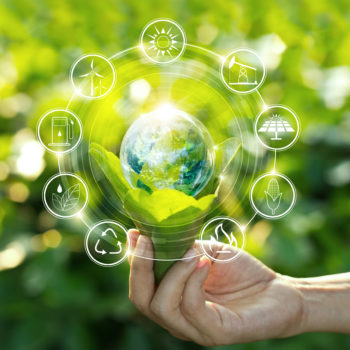
In answering the call of eco-conscious consumers, brands have significantly boosted their sustainable profiles in recent months. Julia O’Reilly explores the latest developments in this rapidly expanding area
16 March 2020
 As consumers watch the ticking time bomb that is the climate crisis, it’s understandable that sustainability is hot on the minds of many. As the bid to make a real impact becomes more urgent, the sidelines can be a frustrating place to be. That may be why consumers’ consumption patterns have changed in recent months. Consumers in their droves are assessing the impact of where they spend their money. Just as sustainable brands and products have seen a positive kickback from this trend, those that ignore the cause leave themselves at risk of being left behind.
As consumers watch the ticking time bomb that is the climate crisis, it’s understandable that sustainability is hot on the minds of many. As the bid to make a real impact becomes more urgent, the sidelines can be a frustrating place to be. That may be why consumers’ consumption patterns have changed in recent months. Consumers in their droves are assessing the impact of where they spend their money. Just as sustainable brands and products have seen a positive kickback from this trend, those that ignore the cause leave themselves at risk of being left behind.
Research from Kantar found that 77% of UK grocery shoppers have switched, avoided or boycotted buying certain brands because of their environmental policies. This figure is greater still among younger consumers, at 87%. Across the board, 90% of those surveyed agreed that brands need to take more responsibility for the waste they produce and the impact it has on the environment.
Push-back against single-use plastic and plastic-dense packaging is mounting. The Global Plastic Action Plan estimates that 8 million metric tonnes of plastic leak into our oceans every year and that by 2050 there will be more plastic than fish in our seas. Several brands have stepped up to the mark and removed single-use plastic from their ranges. Some are researching innovative alternatives to plastic.
To meet consumer demand, businesses are leaning into the circular economy. The system, which aims to eliminate waste through the continual use of resources, has been used as a framework of sorts for many retailers. Products and processes have been optimised to better reduce, reuse and recycle. What’s more, some brands have embraced renewable energy sources, biodiversity and carbon offsetting.
“Industry must show leadership in responding to what is the greatest challenge of our time,” says Minister for Communications, Climate Action & Environment, Richard Bruton. “Every enterprise must look at how they operate their own business, with a view to doing so more sustainably,” he adds. “The entire retail industry has a powerful role to play in tackling this issue.”
Just as the retail industry adapts to combat the big issue of our time, we’re diving into the leading brands and latest developments within this exciting area.
BWG pioneering the way for sustainable business
A number of new initiatives including the use of CNG fuelled trucks and solar powered energy is ensuring that BWG Foods is not just paying lip service but genuinely innovating and leading the charge in the area of sustainability. Fionnuala Carolan spoke to Willie O’Byrne, managing director, BWG Foods, about the acceptance that going green is the only option
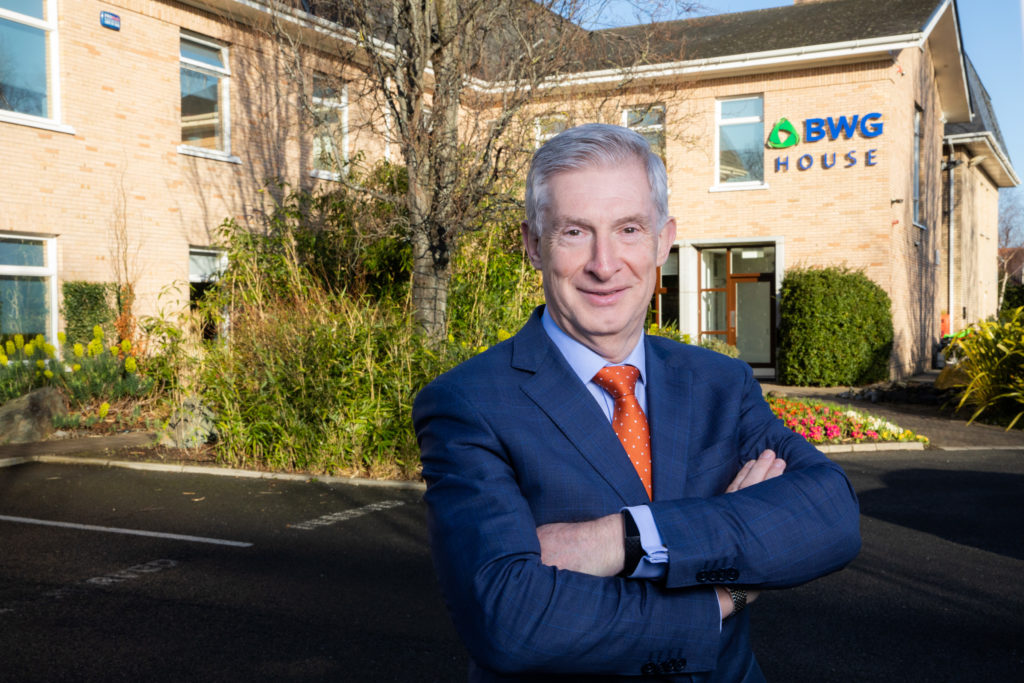
Willie O’Byrne, managing director of BWG Foods, believes “sustainable business is about doing things that have a long-term future for your business”
While they say charity begins at home, so too it seems do good sustainable practices. When ShelfLife met Willie O’Byrne for a chat about the company’s sustainability credentials, he arrived with a keep-cup coffee in hand. Disposable cups, as we all know, have been identified as a huge contributor to everyday waste in this country. BWG Foods is determined to change the practice of using disposable cups in its head office and will be adding a rinse function for reusable cups to all of its coffee machines this quarter. The company has plans to further incentivise employees to reuse their cups throughout the day by asking those who do take a disposable cup to make a donation to charity. The company is targeting through this initiative to reduce disposable cup usage by 90%.
What sustainability means in business
While this is a great initiative, it’s only the tip of the iceberg of what is evolving in one of the country’s largest retail groups that has a 52% share of the convenience market. O’Byrne says sustainability is entwined with each and every part of the business, believing that sustainable business practice will not be a differentiator in business in the near future but the only practice. He explains why. “We have accepted that root and branch change is necessary to secure our future. Today husbandry is back in vogue,” says O’Byrne. “You need to know that the business can be just as good this year as next and that we are not just using up resources that are finite.”
BWG Foods is currently working towards Bord Bia Origin Green accreditation. “It forces a pressure on us not to just pick and choose initiatives but to do the whole bit right,” he says.
Hitting the road
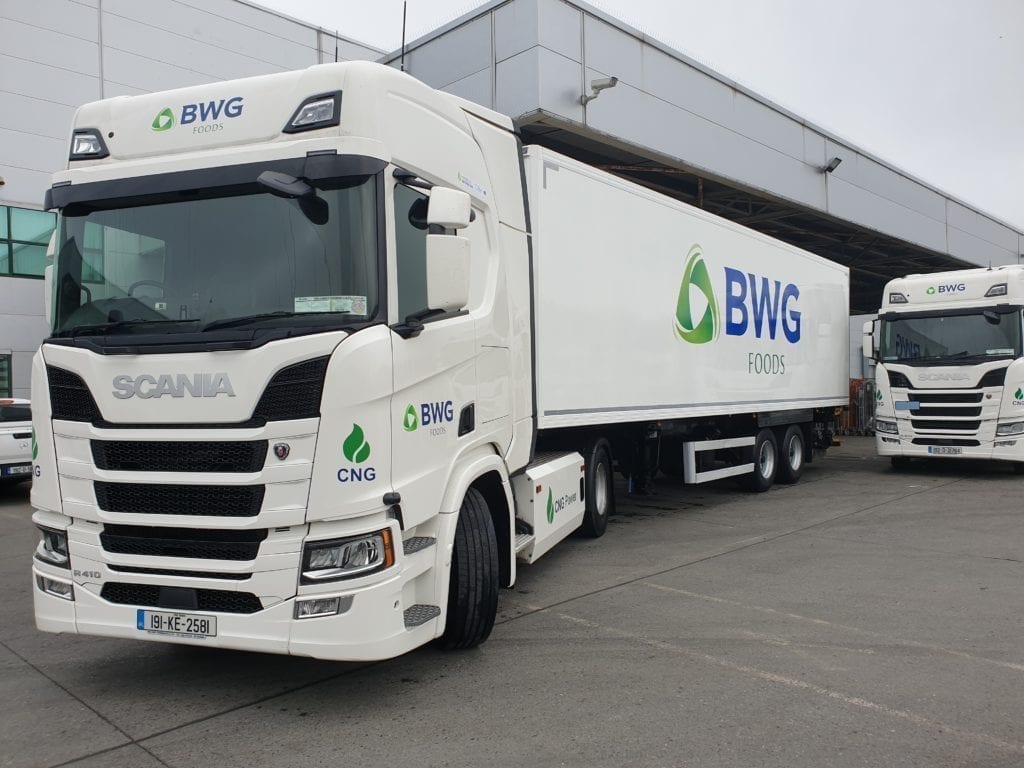
In 2019, BWG Foods announced an €11 million investment over the next five years, beginning with the launch of a fleet of 14 compressed natural gas (CNG) vehicles to replace the old articulated diesel trucks
Putting their money where their mouth is, late last year the company announced an €11 million investment over the next five years, beginning with the launch of a fleet of 14 compressed natural gas (CNG) vehicles to replace the old articulated diesel trucks, at an initial cost of €2 million. Each of BWG Foods’ new trucks will complete approximately 120,000 kilometres each year, each truck saving at least seven-and-a-half tonnes of CO2 emissions in the process. When biogas becomes available for use, BWG Foods intends to use that and the company projects that CO2 emissions from its new delivery fleet will decrease by approximately 90% compared with today’s levels.
“When it comes to the heavy transport that we are involved in, there isn’t an electric truck yet that is viable for the distances we do. That’s why when it has come to transport, we have put our backing into compressed natural gas as a fuel,” explains O’Byrne.
So, what makes CNG fuel better than diesel? “At the end of the day CNG is still a carbon fuel,” he says. “What it is though is a much cleaner fuel and in terms of actual efficiency, you have a 22% betterment over diesel. So, in that sense you are generating less carbon gases.
“Also, CNG can very easily be substituted with biogas,” O’Byrne adds. “Our plan is to eventually use it as our preferred fuel of choice and we now have a trial with a biogas producer to go 100% biogas in two of our new units. We will use these for city centre work rather than long distances.”
Rerouting and consolidated deliveries
While the cleaner fuel is a very welcome innovation, BWG Foods is also trying to reduce the number of miles covered with a re-routing programme which has led to the reduction of more than 2.3 million kilometres travelled annually. Increasing individual delivery vehicle capacity by 15% has further reduced the number of journeys required.
“While CNG fuel will reduce your emissions, rerouting and dynamic routing changes the amount of mileage you do,” says O’Byrne. “A drawbar trailer where you effectively have two trailers on the same tractor unit can significantly reduce your mileage. When you look at the matrix of the stores, consolidated deliveries are very important too. For instance, we now deliver ambient, fresh, frozen and alcohol on the one truck. Until recently, they would have all been delivered separately. A lot of these things are good for the environment but also good for business so it’s win, win.”
Solar energy
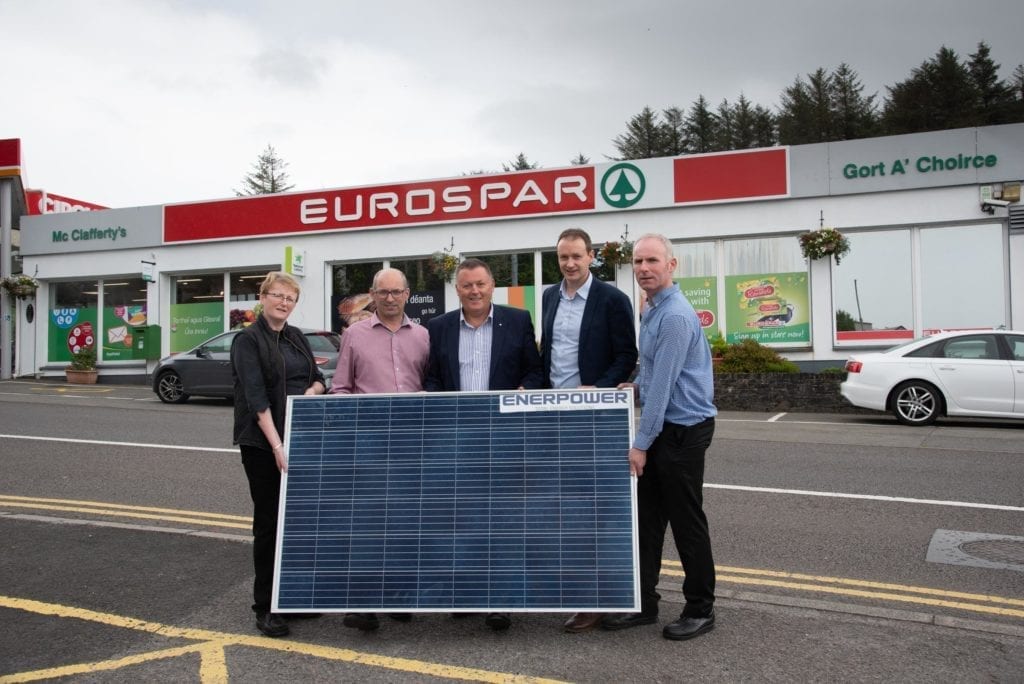
Eurospar Gortahork’s installation of solar panels has seen a 15% reduction in carbon emissions and energy bills. Pictured at the supermarket in Donegal were: Marie McClafferty, Pat McClafferty, Eurospar Gortahork; Malachy Hanberry, managing director, Eurospar; John Carty, projects director of Enerpower and Thomas McClafferty,
Last year BWG Foods partnered with Enerpower to encourage independent retailers to improve their green footprint by installing solar panels on their stores. Leading by example again, the company installed 794 solar panels on the roof of its national distribution centre in Kilcarbery. “Because we have a chilled plant there, there is quite a high electricity demand in Kilcarbery and we are generating around 20% electricity from these solar panels, which is really quite significant,” O’Byrne tells ShelfLife.
The first retailer to take the plunge was Eurospar Gortahork in Co Donegal. Since the store installed solar panels, it has seen a 15% reduction in carbon emissions and energy bills.
The solar panel scheme is one of a number of affinity schemes that the company has pioneered. A scheme in conjunction with Electric Ireland for the rollout of LED and sensor lighting across the network has been hugely successful in recent years.
BWG Foods has also started to roll this initiative out across its full retail estate of Spar, Eurospar, Mace, Londis and XL convenience stores.
Food waste
BWG Foods has had a longstanding relationship with FoodCloud, the social enterprise that connects businesses’ surplus food to charities. The most visible activity is during the company’s annual trade show whereby at the end of the show, FoodCloud removes all the fresh product and redistributes it to charity, equating to 10 tonnes of food. BWG Foods also links in with FoodCloud through its cash and carry business. “Across our cash and carry network,” says O’Byrne, “there will always be product that you have to withdraw from sale and we link in with Food Cloud on that.”
When fresh food has surpassed the date that even FoodCloud can accept it, BWG Foods has found a novel way to dispose of additional food waste. “When we have product that FoodCloud can’t accept, our biogas producer will use it as part of the feedstock that becomes the biogas that goes into the trucks so that’s a very nice closing of the loop.”
O’Byrne is also keen to highlight the work that is being done by Repak across the sector. “We are proud members of Repak,” he says. “Our retailers are working to best Repak practice. Some of that money generated is used in relation to our own waste but a lot of that money goes to support the green bin scheme across the country.”
Replacing plastic
One of the first successful countrywide sustainable practices was the introduction of the plastic bag levy in 2002. Trying to reduce plastic across society is an ongoing process. Plastic is widely regarded as something that we need to replace. However O’Byrne has another viewpoint. “We’d like to eliminate all plastic but the plastic is actually improving shelf and product life so there is definitely an equation between waste and longevity of product. It’s not just a simple matter that you take one out and suddenly the world is better off. We want to find ways where we use recyclable, reusable products without compromising on quality.” The company is currently replacing the black trays on its own brand Glenmór meat range and trialling compostable trays for its Fresh Choice range of fruit and vegetables.
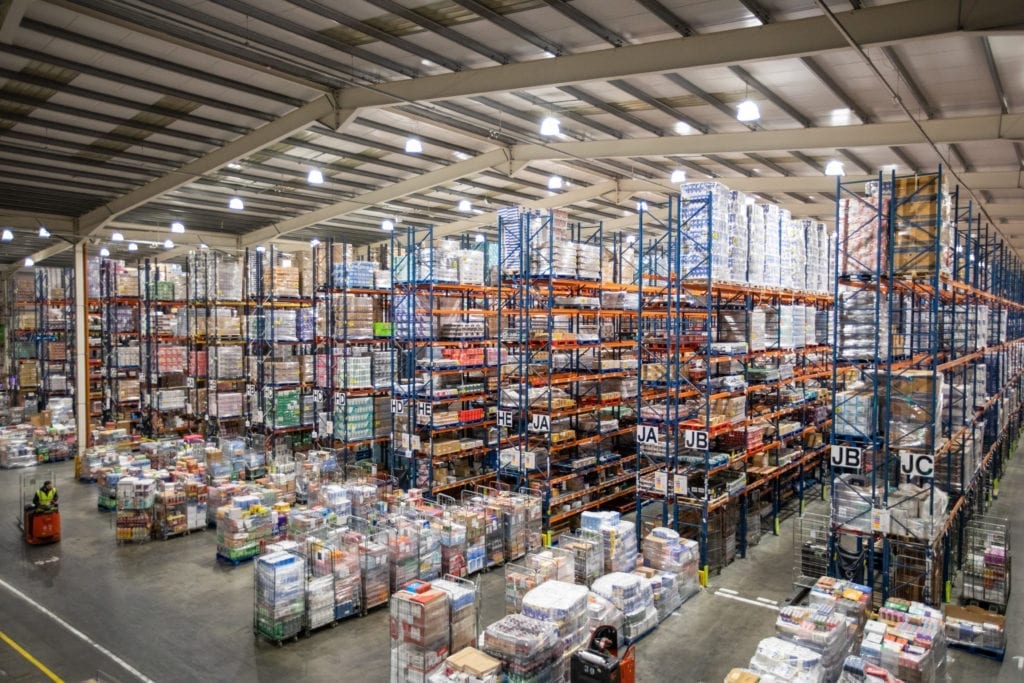
At BWG Foods’ national distribution centre in Kilcarbery, the company in partnership with Enerpower installed 794 solar panels on the roof, with the result that 20% of the NDC’s electricity is derived from these panels. This is in conjunction with their previous initiative of installing LED and sensor lighting at the 250,000 sq ft distribution centre
A lot of work is being done behind the scenes on replacing plastic packaging on pallets and shrink wrap, a process that is not visible to the public. The company has also tried to eradicate the amount of paper that is being used with deliveries by replacing the traditional ‘print packs’ which can include reams of paper with electronic goods-received notes that feed into the integrated EPOS and accountancy package in stores.
Leading the charge
It is evident that the company is receptive to any new technologies that will make savings to its business and contribute to its green credentials. O’Byrne explains there was a youth parliament in the Dail recently and one of the recommendations was that there would be a mandatory application of doors on fridges in retail to reduce emissions. “We have been working on an alternative to fridge doors,” he explains. “We have partnered with a company that has designed an air curtain which insulates the chilled part of the fridge from the rest of the shop by manipulating the way the air is ducted. With this technology you can walk down a refrigerated aisle without feeling cold. It keeps the cold in and the heat out. So that’s been a really interesting technology and one we would like to investigate further.”
An engineer by trade, it is evident O’Byrne is genuinely interested in and open to new technologies and keen to be seen as an innovator. He is happy with the strides the company is making but says he is also keenly watching what is happening elsewhere. “You’d be very arrogant if you are not open to the initiative and the enterprise of your competitors. I would watch them all and am very happy to copycat and I’d like to think that in many things, we are ahead of the curve. It’s very hard to deny that there’s a five to midnight element of what’s happening at the moment and in the context of civilisation, five to midnight can be 50 years or 100 years but it is short in the context of all time. If we are to make a difference to forces of change already impacting the planet, then we have to consume what is renewable and at a rate that replenishment copes with demand. Sustainable business is about doing things that have a long-term future for your business.”
Q & A with… VivaGreen founders Garrett and Russell Walsh
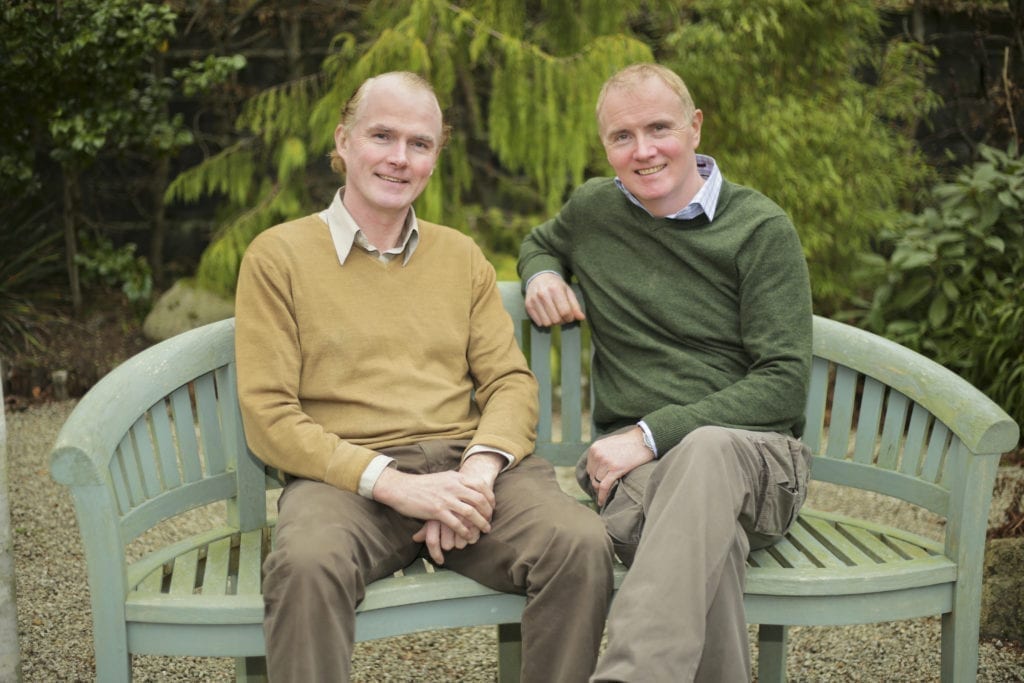
VivaGreen founders Garrett Walsh (head of research and development) and Russell Walsh (head of manufacturing)

Q: For decades, VivaGreen has been delivering top quality eco-friendly products to the retail market – where did it all start?
A: My brother Garrett and I set up VivaGreen almost 30 years ago; driven by our engineering backgrounds to develop innovative products made from sustainable sources. In the early 90s, we were both working in the US and environmental issues and waste problems were at the forefront of our minds. We started looking at how we could use our engineering skills to develop products that would reduce waste and be kind to the environment and we returned to Ireland to set up the business in 1992. One of our first products we developed was GreenStake, a plastic-free biodegradable landscape stake for pinning sod and tents that breaks down into the soil. We sold over 1 million to Glastonbury Festival and today the product is used by the likes of Augusta National Golf Club.
Q: Sustainability and environmental awareness has always been at the forefront of VivaGreen’s range. In the early days of the brand, what inspired this awareness and how has it evolved since then?
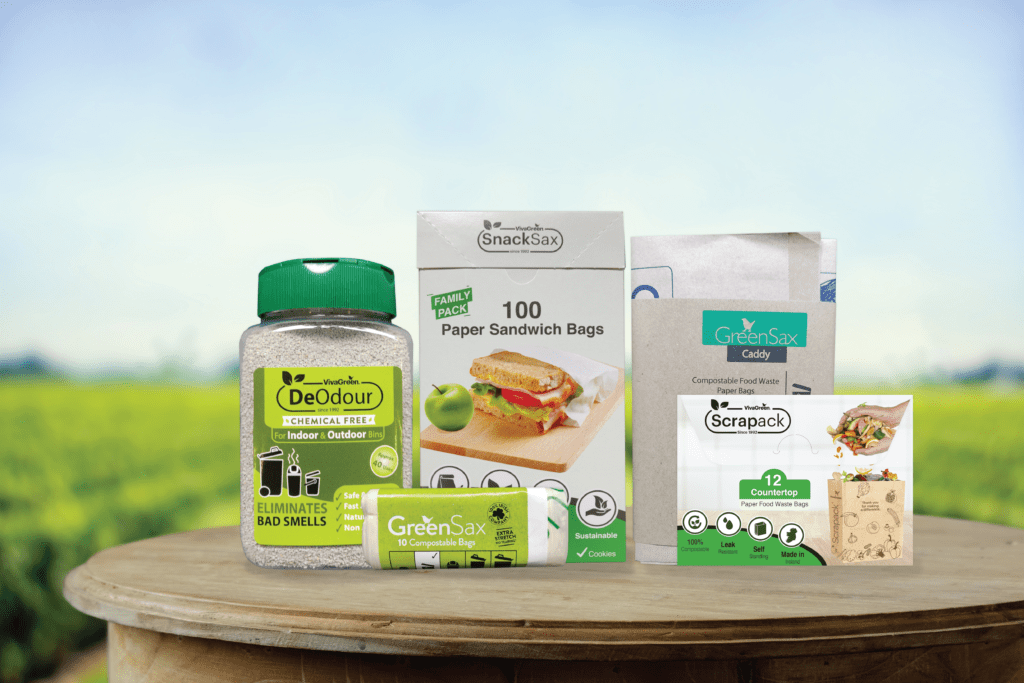
VivaGreen’s GreenSax range was one of the first compostable bag products to hit the shelves in Ireland
A: Perceptions about environmental issues have changed hugely over the last 30 years, resulting in changes in consumer behaviour, particularly in more recent times. When we set up VivaGreen, very few people were making purchasing decisions based on how they impacted the environment. Our products were as eco-friendly then as they are now; however, the main reason people bought them was because they were good quality and saved them money. Those reasons still apply today, but we now have a growing base of customers who are using our products because they are eco-friendly, good quality, cost effective and made in Ireland. Today, people are more conscious about supporting local, doing their bit to help the environment and minimising the use of chemicals in their homes and all our products meet these consumer demands. Our most popular range of GreenSax compostable bags – one of the first compostable bags to hit the shelves in Ireland – continues to grow with the recent launch of our SnackSax 100% compostable paper sandwich bags. Our Chemical-Free range includes, MossOff Chemical-Free, which is completely safe to children, pets and plants and DeOdour Chemical-Free, which eliminates bad smells in bins.
Q: Tell us about the new product range, and what makes them stand out in a competitive segment?
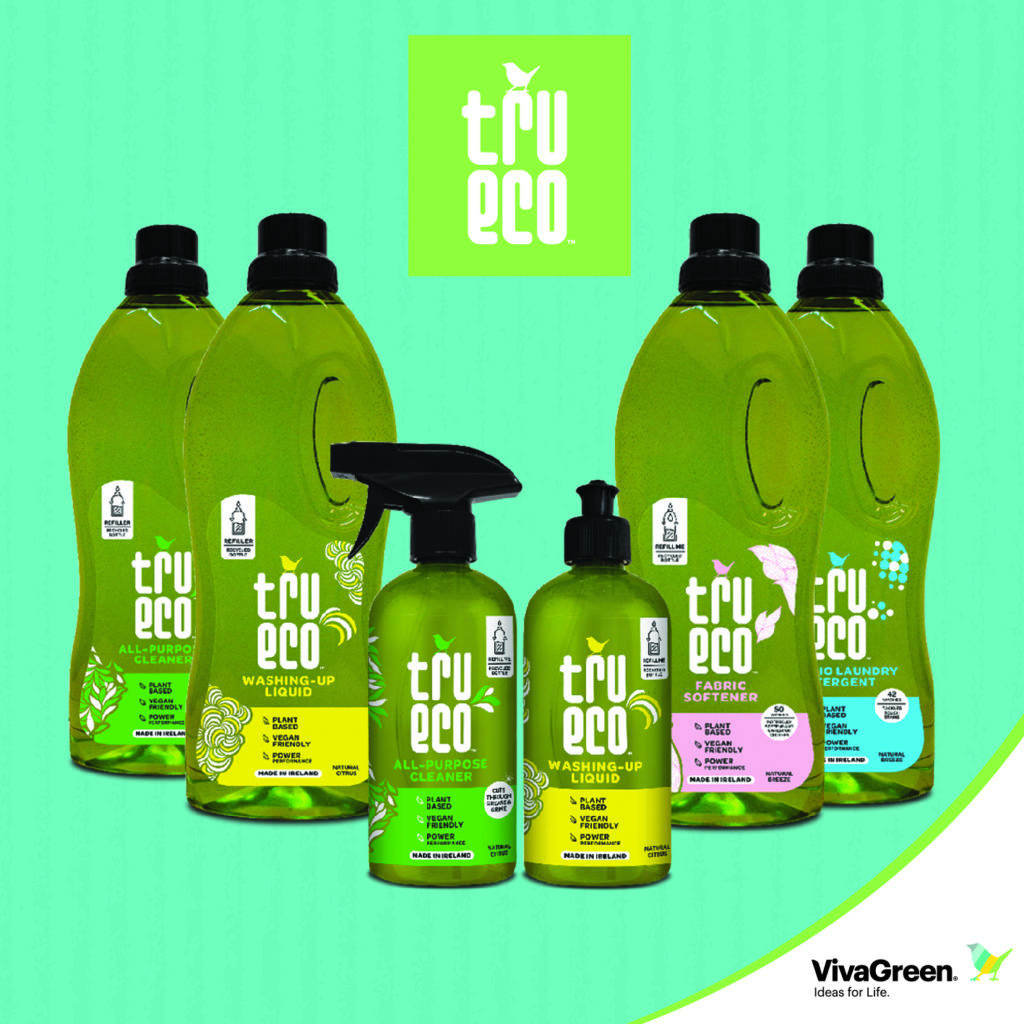
The Tru Eco range includes All Purpose Cleaner (500ml and 1.5L), Washing-Up Liquid (500ml and 1.5L), Non-Bio Laundry Detergent (1.5L) and Fabric Conditioner (1.5L)
A: Tru Eco is our new range of refillable, eco-friendly laundry and household cleaning products for conscious consumers. We have replaced harsh chemicals with safer, plant-based, biodegradable ingredients. The four-strong product range includes All Purpose Cleaner (500ml and 1.5L), Washing-Up Liquid (500ml and 1.5L), Non-Bio Laundry Detergent (1.5L) and Fabric Conditioner (1.5L). The bottles are made from 100% recycled plastic, and they are reusable, recyclable and refillable. More and more consumers are switching to green cleaning to reduce chemicals in their home and we developed Tru Eco to meet a gap in the market for an eco-friendly cleaning range at an affordable price without compromising on quality. We worked closely with an Irish-based, independent environmental scientist, to ensure sustainable practices using naturally derived and biodegradable ingredients which are free from harsh chemicals but work together to deliver a powerful performance. Tru Eco products are guaranteed Irish, plant-based, cruelty free, septic tank safe and developed in Ireland. Reducing its carbon footprint even lower, Tru Eco offers a refill solution, which creates a circular economy product and closes the loop on plastic waste.
Q: What marketing activity is planned for the new VivaGreen range?
A: To support the launch of Tru Eco, we will be implementing a national PR campaign and digital marketing activity targeting environmentally conscious consumers. For more information about Tru Eco and our full range of products, visit www.vivagreen.ie.
Q: Sustainability, climate change and a plastic-free future is very high on the agenda for practically every industry in the world. As experts in the area, what are your predictions for this initiative in the coming years?
A: Legislation, such as the EU’s 2030 climate change targets, is driving innovation, leadership and sustainable production development to fight climate change. Consumers are also driving change and demanding that businesses meet certain standards and offer alternatives to plastic, chemicals, and imported goods. Innovating, developing and manufacturing eco-friendly, chemical-free products is at the core of what we do in VivaGreen. By buying Tru Eco products, consumers are supporting a local, eco-friendly business, and reducing their plastic waste footprint, environmental impact as well as lowering carbon emissions.
Dedicated to greater sustainability
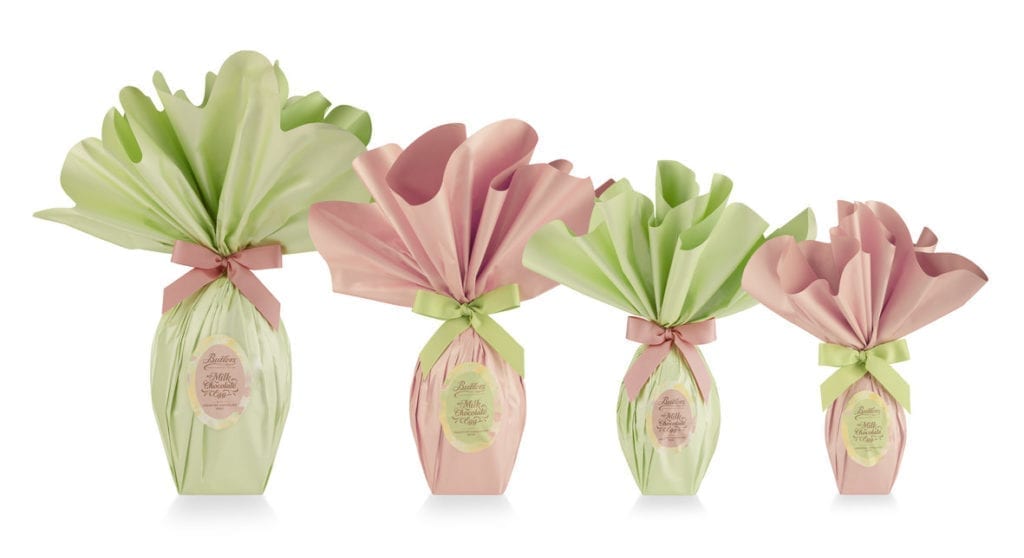
The stylish pink and lime ribbon used within the Butlers 2020 Easter Collection has been created from 100% recycled consumer plastic bottles
Butlers Chocolates is committed to systemic change on the path toward greater sustainability and is dedicated to reducing energy inputs, minimising the carbon footprint and lessening its impact on the environment. For many years the long-established luxury chocolatier has undertaken numerous sustainable and ethical practices across the business, such as a commitment to local sourcing, using recyclable packaging and the reduction of single-use plastic.
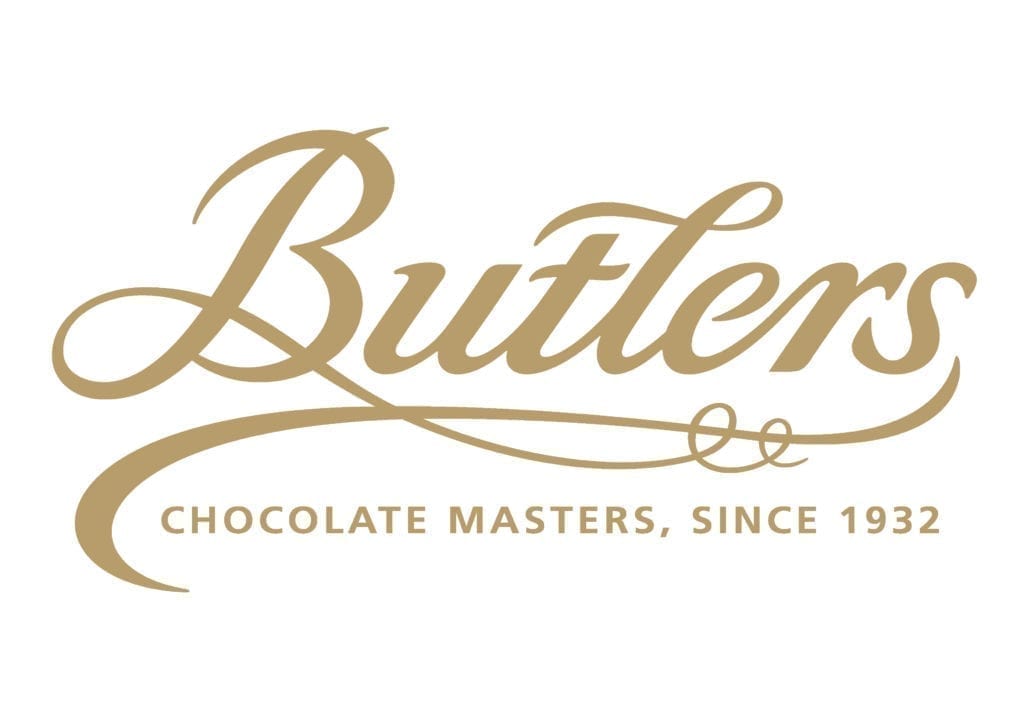 Butlers is a fully verified member of Origin Green. All Butlers Chocolates are crafted using sustainably sourced cocoa under the Cocoa Horizons umbrella. The Butlers factory in Dublin has a zero waste to landfill and hosts Ireland’s largest solar panel installation on its roof, providing approximately 14% of the factory’s annual electricity needs – the equivalent production resource for 2.5 million chocolate bars.
Butlers is a fully verified member of Origin Green. All Butlers Chocolates are crafted using sustainably sourced cocoa under the Cocoa Horizons umbrella. The Butlers factory in Dublin has a zero waste to landfill and hosts Ireland’s largest solar panel installation on its roof, providing approximately 14% of the factory’s annual electricity needs – the equivalent production resource for 2.5 million chocolate bars.
All coffee served in Butlers Chocolate Café is Fairtrade. While customers are incentivised to bring a reusable cup, all takeaway coffee cups are 100% recyclable and made and printed in Ireland.
This spring, most of the Butlers 2020 Easter Collection will be presented in either recyclable or keepsake packaging. The stylish pink and lime ribbon used within the collection has been created from 100% recycled consumer plastic bottles. As part of its continuing journey in 2020 to reduce the usage of single-use plastic, Butlers is replacing the PET holders in its wrapped eggs with a cardboard alternative – an initiative that will save approximately three tonnes of plastic this Easter season. For more, see www.butlerschocolates.com.
3:1 water to wine ratio
E&J Gallo Winery has released a sustainability report as part of its commitment to improving its processes, reducing its carbon footprint, and preserving natural resources. To realise these goals, the company has pledged to minimise its use of fertilisers and pesticides where possible, recycle and reuse process water, protect river habitants and create new wetlands. By 2022, the winery plans to achieve an industry-leading 3:1 water to wine ratio.
According to the report, E&J Gallo has installed 10 acres of solar panel fields since 2015, offset 20% of its energy usage by making biofuel from grape seeds, and saved 100,000 gallons of water by switching to ultraviolet sanitation.
Smart sustainability
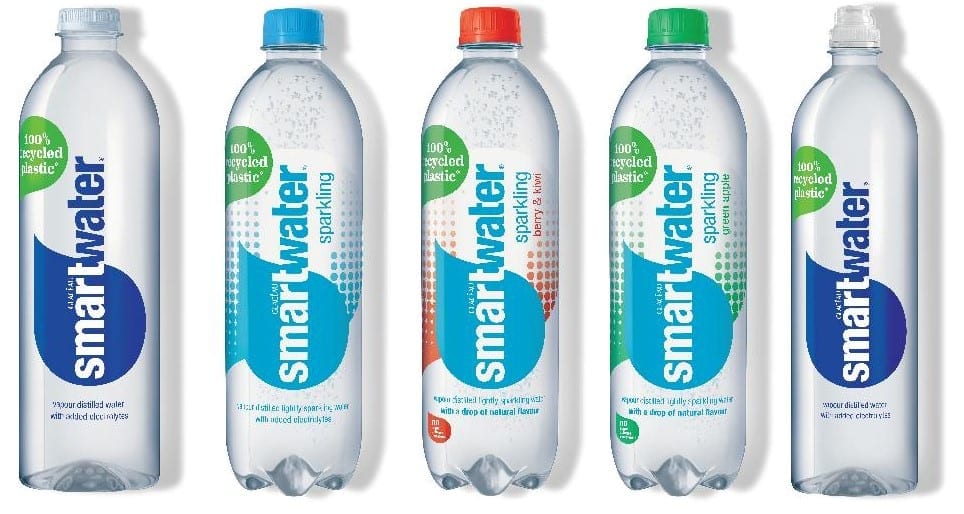
Worth €1.17m, the Glacéau Smartwater brand now uses 100% recycled plastic bottles
In the latest move as part of its sustainable packaging strategy The Coca-Cola Company, in partnership with Coca-Cola Hellenic Bottling Company, have announced that Glacéau Smartwater bottles are now made from 100% recycled plastic (rPET).
Glacéau Smartwater, the third largest on-the-go bottled water brand in Ireland, will move its entire range and both its 600ml and 850ml servings into plastic bottles made from 100% recycled PET plastic. The changes will remove 3,100 tonnes of virgin plastic from circulation each year and will mean that Coca-Cola Hellenic Bottling Company is the only soft drinks supplier in Ireland to now have its full on-the-go water portfolio 100% rPET.
Smartwater has continued to grow month-on-month with the brand more than doubling in size over the last year and growing by 68.8% in January versus the previous year. Smartwater has added an incremental €814,000 to the water category in the last year, making the brand now worth €1.17m. Smartwater continues to grow faster than Evian (+2.2%) and Volvic (-2.2%)* and, with the launch of the new 100% rPET bottle, the brand hopes to accelerate its growth further.
At the same time, Coca-Cola is continuing to work with local re-processors to double the amount of recycled PET used in all its plastic bottles, across 20 brands, to at least 50%. The new packs will be launched ahead of schedule in early 2020 and will make Coca-Cola the biggest user of recycled PET plastic in Ireland.
This is the latest action from Coca-Cola as it marks two years since it launched its sustainable packaging strategy – in which it set out an ambition to work with others to ensure that all its packaging is recovered so that more can be recycled and none ends up as waste. It comes as the Coca-Cola Company took a series of actions in countries across Western Europe that will remove 9,000 tonnes of virgin plastic from circulation and replace it with recycled plastic over the course of the next year.
The launch of the new 100% rPET Smartwater bottle will be supported with a fully integrated marketing plan in April, which will drive awareness through outdoor advertising (OOH) and social, using Instagram to maintain long term presence. In-store point of sale will also help call out the 100% recycled message on shelf. June will see the company further reinforce its sustainability message for the brand with an exciting ‘message on a bottle’ campaign which will see various recycled/recycling messages printed across Smartwater bottles.
*(Source: ROI MAT to January 2020)
*(Source: Smartwater Brief 2020 – ROI Only)
Committed to sustainable future
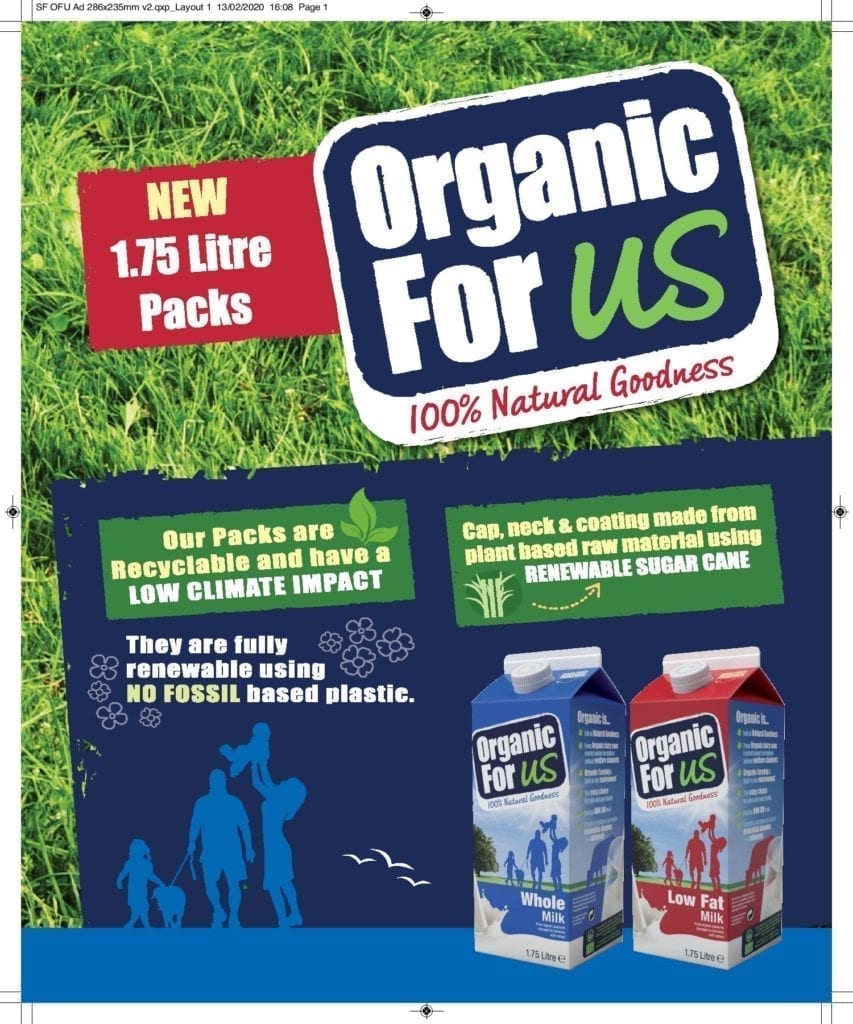
Aurivo spent €38 million on sustainability initiatives over the last seven years
Aurivo, a dairy processing co-op, was named the most sustainable business of 2019 at Compass Group’s annual awards.
The company is committed to the cause, having claimed to have spent €38m on sustainable initiatives over the last seven years. Its initiatives include using woodchip and liquid natural gas to process milk, reducing heavy fuel oil usage and cutting carbon emissions by 75%, or 25,000 tonnes per year.
What’s more, the heat pump technology in its Co. Donegal liquid milk site reduced fossil fuel consumption by 80%, which the company says makes it one of the most sustainable liquid milk plants in the country.
It’s not just the product that’s sustainable – thanks to the introduction of a 1.75L bio-based carton for Organic For Us, Connacht Gold and other retail milk brands can now offer their consumers the first renewable carton on the market. Made of 75% paper, the carton’s cap, neck and coating have been sourced from plant-based raw materials using sugar cane.
Combatting climate change campaign
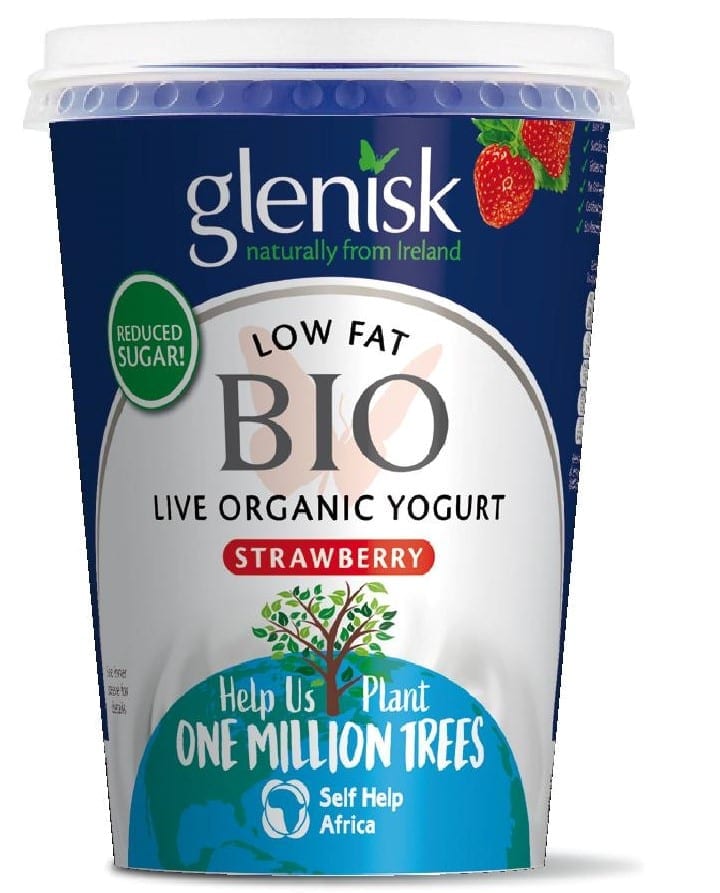
One million trees will be planted across Ireland and Africa in a bid to combat climate change
Irish people can help to combat climate change by supporting a new campaign to plant one million trees in Africa in 2020. How do you plant one million trees in Africa? According to Glenisk and Self Help Africa, it’s by planting 100,000 trees in Ireland.
One Million Trees is a local-to-global initiative that will see development charity Self Help Africa plant ten new trees in Africa for every single native tree planted in Ireland. The initiative is supported by Irish dairy brand, Glenisk through its Bio Organic Yogurt range.
Self Help Africa will plant one million new trees in sub-Saharan Africa in 2020 and an additional 100,000 native trees in Ireland. This campaign is affiliated with one of the biggest global reforestation efforts in history, the UN-backed initiative One Trillion Trees.
Native Irish trees will be planted by local partner, Trees on the Land, while the SuperValu chain will act as a retail partner to the campaign and will work with Glenisk to support in-store fundraising promotions throughout the year.
“The message of this campaign is that while no-one can do everything to combat climate change, everybody can do something,” says Ray Jordan, CEO, Self Help Africa. “In Africa, trees not only help remove harmful greenhouse gases from the atmosphere, they also provide an important source of food, income, shade and shelter for rural poor households.”
The initiative will also be backed by the Gaelic Players Association (GPA) and the Primary School Teachers’ Union. Paul Flynn, president of the GPA said that Gaelic inter-county players past and present were proud to be involved and would champion an initiative that could have a positive impact on an issue that was of both local and global importance.
As part of the campaign, Vincent Cleary, managing director of Glenisk, has pledged to reforest up to 120 acres of what was previously Glenisk Wood in Co. Offaly.
For more information, visit selfhelpafrica.ie/onemilliontrees.
Eat good, do good and feel good
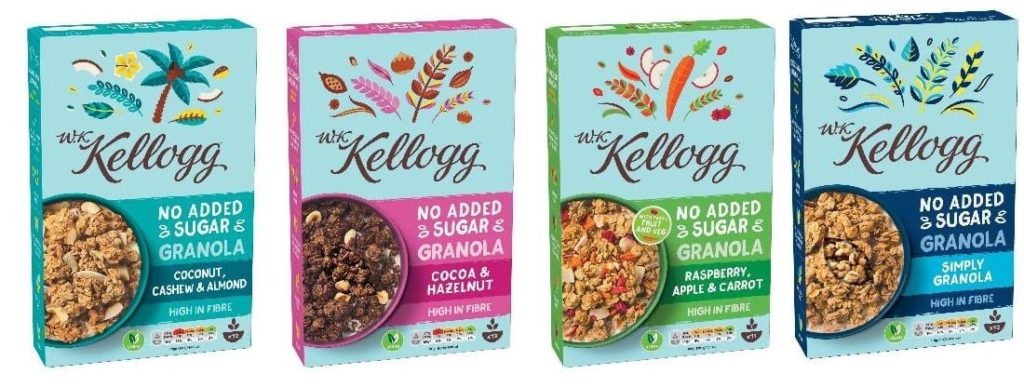
Kellogg’s tasty W.K Kellogg range not only tastes good but also does good as 10c from each box goes to good causes.
Every bowl of granola, cereal or snack in the W.K Kellogg range is delicious, wholesome and nutritious as the world’s largest plant-based food company believes in the power of eating good food.
Kellogg’s founder, William Keith Kellogg, believed in giving back. That’s why 10c from every box of W.K Kellogg sold will go to a good cause, like the Breakfast Club Programme in Ireland. The main purpose of a breakfast club is to provide a safe, secure environment before school, where children can have a decent breakfast with their friends. Children who have a good breakfast have improved concentration, improved attendance and punctuality, better behaviour and improved attainment and achievement at school.
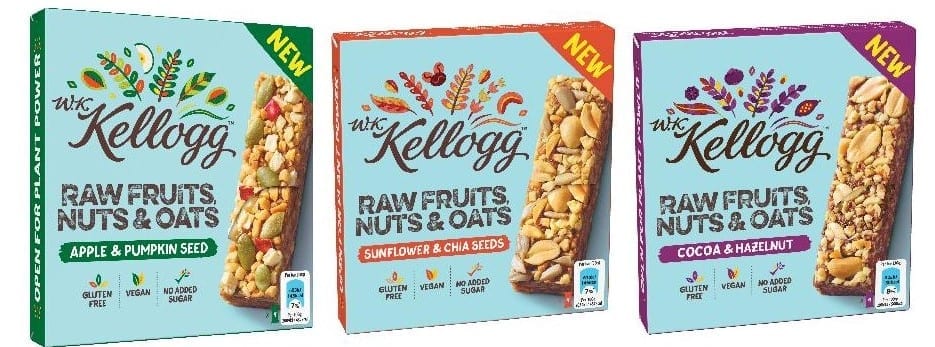 Kellogg’s believes that eating good, wholesome food and giving back to the community goes a long way to making you feel good.
Kellogg’s believes that eating good, wholesome food and giving back to the community goes a long way to making you feel good.
The W.K Kellogg range has no added sugar or artificial sweeteners, no palm oil and is suitable for vegans. It has tasty clusters of baked wholegrains, which are a perfect plant-based protein.
The W.K Kellogg range includes a tasty selection of no added sugar options in Raspberry, Apple & Carrot, Cocoa & Hazelnut, Coconut, Cashew & Almond and Simply Granola. The range also includes the new W.K Kellogg by Kids. The first children’s cereal to include fruit and vegetables that was created for kids by kids is available in Blueberry, Apple & Beetroot and Strawberry, Apple & Carrot.
The plant-based, vegan range includes Nuts & Raw Fruit Bars for on-the-go snacking, available in Cocoa & Hazelnut, Apple & Pumpkin Seed and Sunflower & Chia Seed.
Triumph at Green Awards
Ice Water was recognised for its sustainable water achievement at the annual Green Awards last month. Ice Water was lauded for replacing bottled water with premium filtered solutions in many Irish offices, such as Twitter, Air BnB, PwC and Survey Monkey. These installations contributed to a reduction in single-use plastic usage.
The company claims that its installations and bottle filling stations reduced the number of plastic bottles coming into the Irish market in 2019 by 15 million. “As a small company, says Peter Wynne, CEO, Ice Water, “it is a hugely significant achievement for Ice Water to be recognised on a national scale for our commitment to sustainability.”
Lauded for green credentials
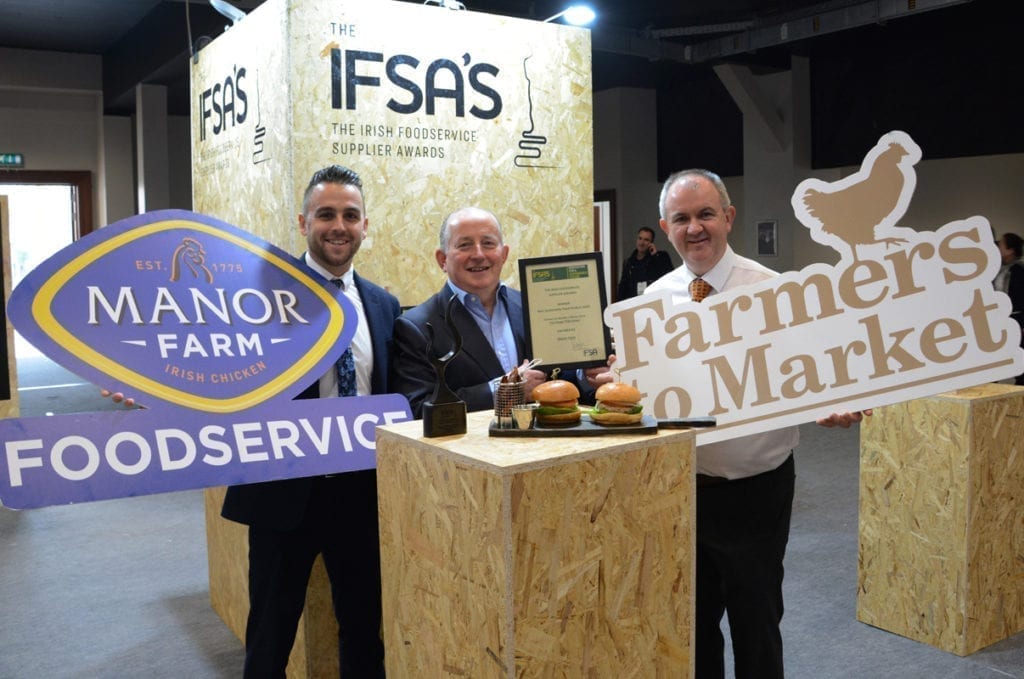
(L-R): Matthew O’Gorman, Manor Farm; Maurice Bergin, MD, Green Hospitality Programme; with Charles Smith, co-founder, Farmers to Market
Chicken processor, Manor Farm, won the best sustainable food product at the 2020 Irish Foodservice Suppliers Alliance (IFSA) awards. The processor was awarded for its ‘Farmers to Market’ Free-Range Chicken Thigh Burgers.
Matthew O’Gorman, Manor Farm says: “We are delighted to have won the best sustainable food product award this year. We have been working alongside Farmers to Market to ensure the best quality product was produced without compromising on our sustainability goals. We are incredibly proud to have our efforts recognised at the ISFA’s. It motivates us to continue to strive to have the best quality poultry on the Irish market.”
The theme of this year’s IFSA’s was ‘Innovation for a sustainable future’, which recognises the industry’s efforts to tackle climate change. The awards categories were designed to celebrate excellence and innovation across all food sectors from beverages to catering equipment.
A ‘Dragon’s Den’ style panel was put together to judge the shortlisted entries, which involved a presentation of the finalists’ sustainability products and services. Judges included, Maurice Bergin, managing director of the Green Hospitality Programme, Brian Walsh, packaging technologist for Repak, and Tony McGuigan, head of procurement and F&B projects for Dalata Hotel Group.
Judges were taken with the Farmers to Market’ Free-Range Chicken Thigh Burgers, commenting: “The winner took a well-known food material and re-imagined it whilst working closely with their own suppliers in a strong and environmentally friendly manner with very strong community support. The simple chicken thigh has a new life.”
Seeds of change
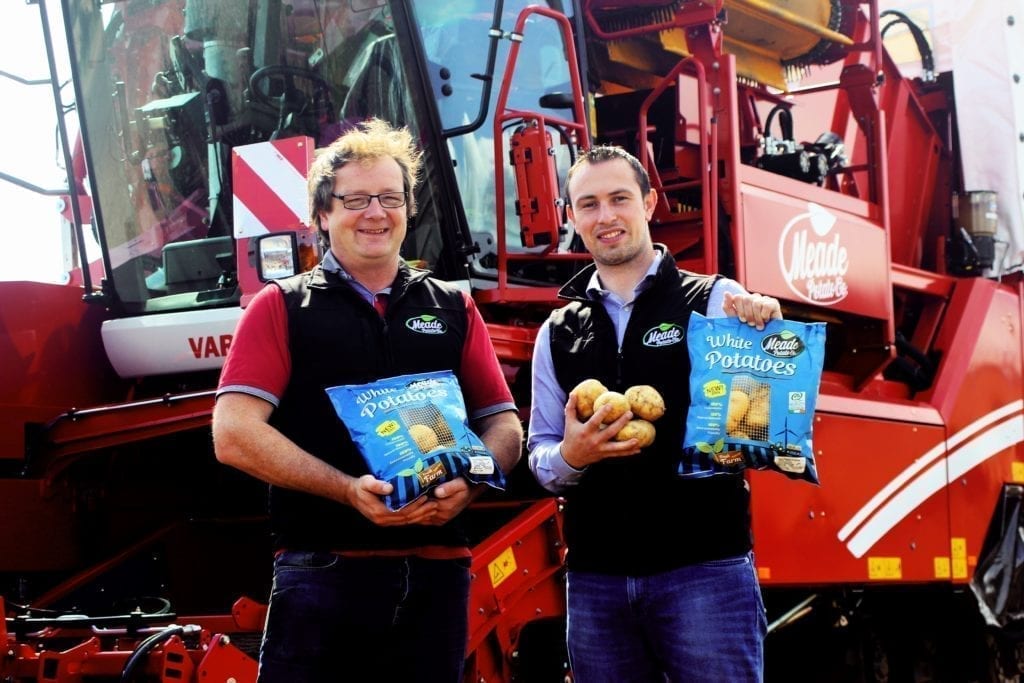
Farm manager Conor O’Malley and commercial director Philip Meade Jr. with the Meade 2kg White Potatoes packed in a 100% compostable paper pillow pack bag
Meade Potato Company, one of Ireland’s leading growers, packers and distributors of fresh produce to the retail and foodservice sectors, has been active and innovative on multiple fronts with its sustainability programme.
Fresh from introducing a first-of-its-kind compostable potato bag to Lidl Ireland, the company is now tackling energy carbon emissions with the planned installation of 300kW of solar panels to supplement its wind turbine. When completed, the panels will take 112.5 tonnes of carbon out of its operation each year. Furthermore, the company can lower herbicide use by mechanically removing weeds from around the crops using specialist machinery.
As reducing food waste is one of the most scalable ways to reduce carbon emission, Meade Potato Company will join forces with FoodCloud for an increased programme of ‘gleaning’ dates for 2020. Gleaning is the process whereby any suitable crops left over in the field after harvesting are not ploughed back into the ground but are gathered by volunteer, CRS or school groups for people in need. The company already makes weekly donations to the community foodbank, which means this gleaning initiative will add further fresh produce donations to FoodCloud.
‘Tomorrow Charter’ initiative
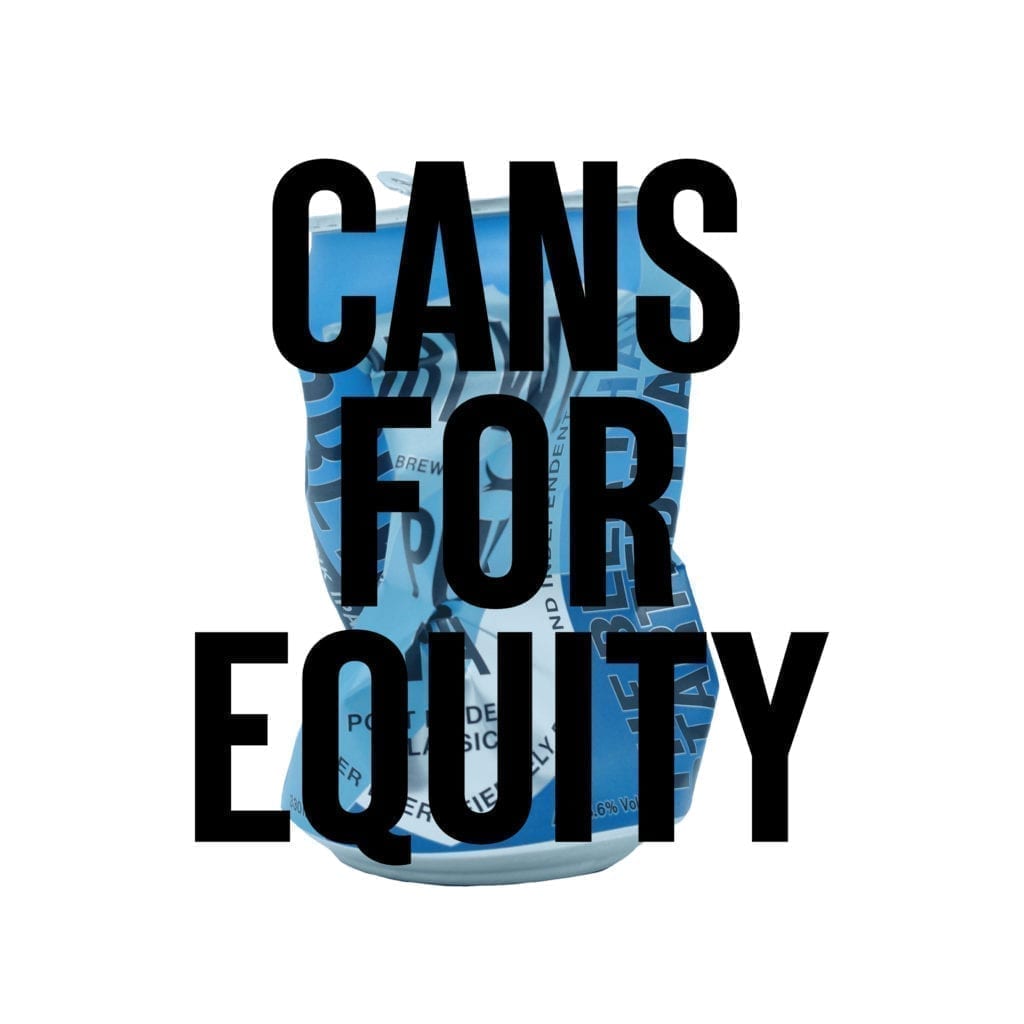
Consumers can trade cans for shares under new initiative
Independent craft brewer, BrewDog, has revealed the details of the first initiative from its sustainable business charter ‘BrewDog Tomorrow’ in collaboration with Cans for Equity. The programme will see BrewDog exchange shares in its business for empty aluminum BrewDog beer cans, in a bid to encourage more sustainable business practices through incentivised recycling.
In a clarion call for turning waste into equity, BrewDog is inviting its customers to bring empty aluminum cans to their nearest BrewDog Bar. In exchange for 50 empty BrewDog cans, consumers will be given a voucher for a share in the Scottish brewery. Those based in Ireland can trade in their empty beer cans at the brewer’s flagship Irish venue, BrewDog Dublin Outpost. The initiative will be live until its latest round of crowdfunding closes in April.
BrewDog Tomorrow comprises of six different initiatives to encourage upcycling within the drinks industry. Other arms of the campaign include, Once Beer Vodka, an initiative distilling imperfect beer into vodka and, DIY Dog, which encourages home brewing to reduce transport miles. The overarching aim is to explore how the drinks industry can have a more positive impact on the planet.
James Watt, co-founder of BrewDog, said: “The BrewDog beer in your fridge can now reward you twice – once when you open it, and again when you hand it back to us.”
For more information, visit www.brewdog.com.
Innovative sustainable packaging
Nestlé will invest up to €1.9bn to migrate from virgin plastics to food-grade recycled plastics and to accelerate the development of innovative sustainable packaging solutions. Building on its 2018 commitment to make 100% of its packaging recyclable or reusable by 2025, Nestlé will source up to 2 million metric tonnes of food-grade recycled plastics between now and 2025. In addition to its in-house research, the company will launch a sustainable packaging venture fund to invest in start-up companies that focus on these areas.
The company intends to reduce its use of virgin plastics by one third in the same period whilst working with others to advance the circular economy and endeavour to clean up plastic waste from oceans, lakes and rivers.
Driving change
Companies that don’t make sustainable changes could get left behind, says Hannah Carter, founder of plant-based baked goods company, Oggs.
As consumers grow increasingly frustrated at the inaction of large companies, Carter predicts that companies that make a difference will reap the rewards. “Consumers are hungry for leadership and change on environmental issues,” she says. “It’s up to brands to start prioritising people and the planet over profitability.”
Right now, Carter says the small companies are driving the change, and it is forcing bigger organisations to rethink their practices. “Food and drinks companies specifically will start to join forces to help advancements in technologies and processes.
“In the coming years,” she adds, “we believe that consumers will start to further prioritise plants in their diet, meat consumption will be occasional and will be even more mindful about their purchases.”
Sustainable winegrowing journey
As a member of Sustainable Winegrowing NZ, Villa Maria has been measuring and reducing carbon emissions for over ten years. It uses rail-freight for domestic shipments and offset emissions though Air NZ FlyNeutral programme. As 30% of its vineyards are organically managed, it uses natural ways to combat pests and disease – such as wildflowers which bring beneficial insects. The company aims to bring this figure to 100% by 2030. Its other sustainability goals include operating a zero-waste landfill by 2025, and to run solely on renewable energy by 2035.
GS1 member spotlight: Airfield Estate
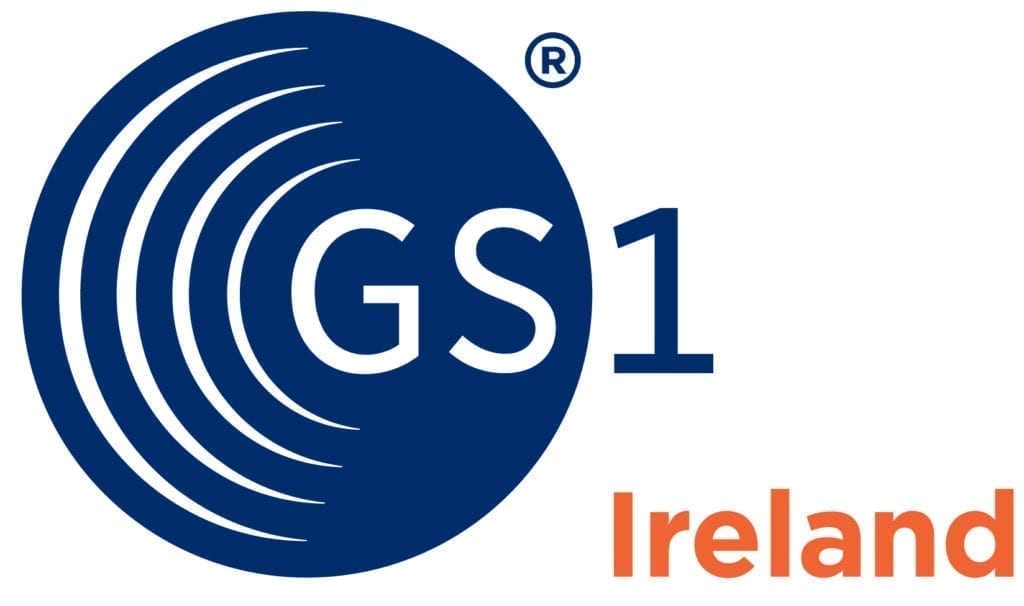 GS1 Ireland and Airfield Estate in south Dublin are working in partnership to improve the impact of food production and consumption on “people, planet and pocket”
GS1 Ireland and Airfield Estate in south Dublin are working in partnership to improve the impact of food production and consumption on “people, planet and pocket”
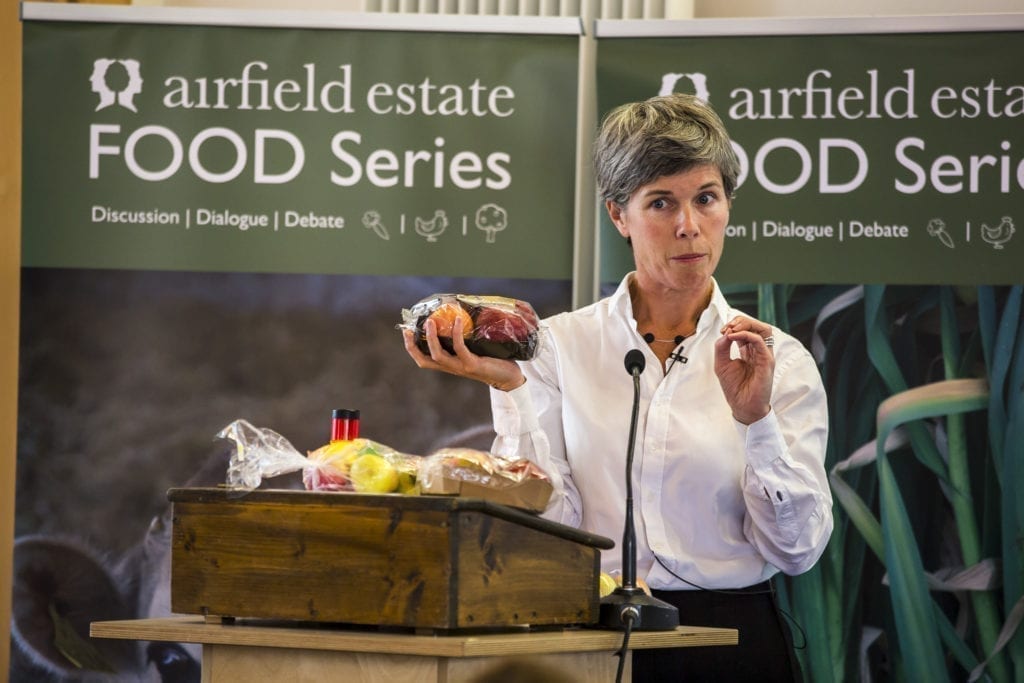
Grainne Kelliher, CEO of Airfield Estate, says the company is “working to ensure that consumers understand the impact of their food choices on themselves, their families, society as a whole and, ultimately, the planet”
Sustainability is an area of increasing focus for many Irish food producers. GS1 Ireland has an extensive track-record of working with members to design and deliver cost-effective, consumer-centric, sustainability solutions.
One of the partnerships GS1 is most proud of is a recent sustainability initiative at Airfield Estate.
“At Airfield, we are concerned with the effect that food production and consumption have on people, planet and pocket and how inaccurate and conflicting information around food is causing confusion for consumers,” says CEO Grainne Kelliher. “We’re working to ensure that consumers understand the impact of their food choices on themselves, their families, society as a whole and, ultimately, the planet.”
Strategic pillars
To address this challenge, Airfield is working within four strategic pillars; Sustain, Connect, Engage and Collaborate. Within the context of the Connect pillar, Airfield and GS1 have commenced a collaboration to explore ways in which the use of food and tech solutions can inform the consumer and nudge them to make food choices that benefit people, planet and pocket.
One such way will focus on milk at Airfield Estate, by providing product traceability information and labelling data to help tackle food waste.
 Traceability solution
Traceability solution
fTRACE is a software system, approved by GS1 Ireland, that captures and records batch level traceability information about a product as it moves through the supply chain. The fTRACE solution will be implemented on Airfield Estate’s milk process, providing Airfield and GS1 with the ability to display and educate food stakeholders on full supply chain traceability and the benefits of advanced product barcodes, in one location.
Building on legacy
Airfield in south Dublin is a 38-acre estate and the original home of the Overend sisters, Letitia and Naomi. Today the estate builds on their legacy, sense of community and charitable endeavours. For example, Airfield used its Jersey dairy herd and life-saving pasteurisation, to donate to the safe milk depot, single-handily reducing infant mortality in Dublin in the early 1900s. It is this Jersey herd that is the focus of the initial traceability pilot project in Airfield and the deployment of mobile technology to make the milk supply chain fully visible to the estate’s customers. In time, the project scope will extend to other key food groups that are particularly susceptible to waste.
Visit www.airfield.ie/about-us for more information.
Date for your diary. Industry seminar: ‘Food loss and waste across the supply chain’, will be held on Thursday, 21 May 2020, in Airfield, Dublin 14. Enquiries and bookings can be made through GS1 Ireland by telephone: 01 208 0660.
Q&A with… Sheila Dowling, sales director at Bewley’s
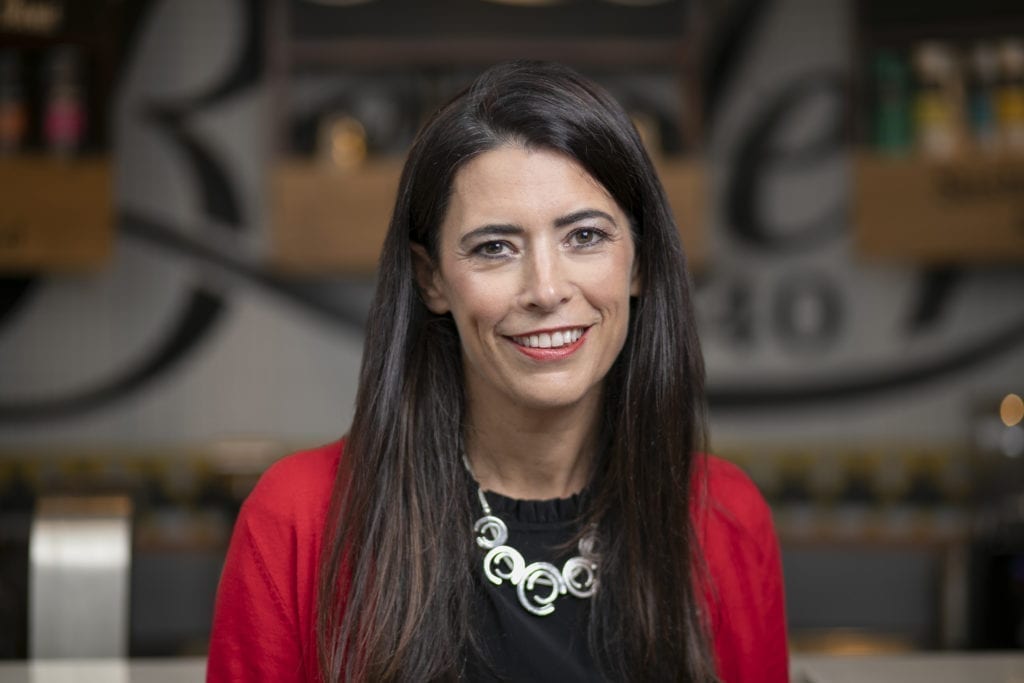
Sheila Dowling
Q: How important is sustainability to your business and why?
A: The Bewley family’s Quaker origins are at the heart of our company, guiding our business practices and the development of our long-term sustainable supply relationships with the world’s best tea and coffee producers. We believe in being ethical and responsible in everything we do and conducting our business in a way that improves the health of the planet and the lives of all those we deal with.
We’re proud of our progress but there’s always more work to be done. We constantly review our practices and set new sustainability goals. Whether it’s new low-energy usage coffee equipment or a reduction on packaging weight, we are committed to developing new greener products, services and systems.
Q: Could you give a few examples of the best sustainability practices you have adopted in your organisation?
A: Since 2006, we have reduced our CO2 emissions per tonne of manufactured product by over 60% and since 2010, we have reduced our waste to landfill by over 80%. All Bewley’s coffee is 100% Fairtrade certified and we were the first to introduce Fairtrade coffee to Ireland over 20 years ago. Other recent initiatives that have been developed include the offset of Scope 1 and Scope 2 Carbon Emissions through the purchase of carbon credits from co-operatives where we buy our coffee. Our tea cartons are made from recycled materials, our coffee capsules and cups are 100% compostable, and we are partnered with Origin Green, Ireland’s food and drink’s sustainability programme.
Q: What does the future of sustainability look like for your business?
A: We recognise that the products we supply and the packaging we put out to the market need to support the circular economy. This is a lengthy and ongoing project as we seek to select the material that has the best chance of either containing repurposed material or of being recycled into a product with a second purpose. We absolutely have this as a focus area for our business and have spoken with other coffee companies to see if there are advantages and insights to be gained through collaboration. Right now, we’re taking action to reduce the weight of foil used in our current packaging, trialling biodegradable foil, developing compostable hand-packed coffee pouch solutions and understanding the waste stream for this.
We’re determined to find a solution that is right for the planet and right for our customers and partners. We need to guarantee the quality and shelf life of our coffee so we can continue to give consumers the best possible taste.
Q: How are you communicating your sustainability credentials to consumers?
A: Sustainability is one of our core brand pillars. We consistently remind consumers about our commitment to it through our various partners, for example Fairtrade, Origin Green and our long-standing partnership with the Irish Hospice Foundation as well as our retail product packaging and this is highlighted throughout Bewley’s Grafton Street. We are also working on a very exciting new product that will be a first in the industry in terms of sustainable practices and we hope to see that launch in early summer.



 Print
Print


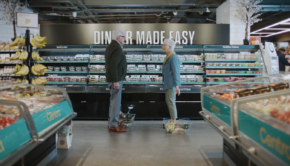
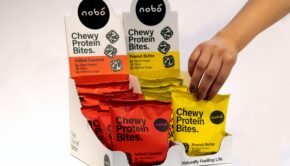
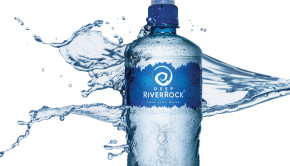

Fans 0
Followers